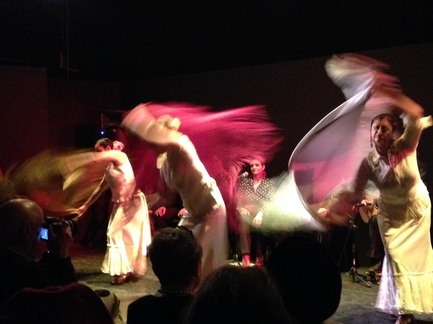 Flamenco Fiesta at Teatro Paraguas (photo: Stephanie Hatfield)
Flamenco Fiesta at Teatro Paraguas (photo: Stephanie Hatfield) In the middle of a flamenco performance, I see the dancer disappear into the dance. Her name is Illeana Gomez. She’s wearing a tight black dress with fringes. Shadows and light play across her face as she whirls on the stage - staccato footwork, sinuous arms. The singer sings a cante about hardship. The voice is deep, tremulous. Las vueltas que el mundo da/Ay, válgame Dios ; The turns the world gives, save me from them, O God. The dance has been building in movement; the song in feeling. And then she goes somewhere else. So do I watching her. I only know it when she comes back, when her expression changes, when her eyes connect back to us and everyone is on their feet, applauding.
Later she tells me that the cante laments the life of a miner in nineteenth century southern Spain. “The feeling is old, heavy, deep, torturous and I was connecting into it.”
“I saw that,” I say, “and I wanted to ask you, ‘where do you go when you dance?’ Because you went somewhere.”
“I don't know,” she says smiling, “but it was intense.”
I think she goes where I go when I write. It’s like falling asleep. You don't realize you’ve been asleep till you wake up. It’s the waking that alerts you to the sleep.
For me, it starts with a kind of premonition that something is emerging. Maybe I’ve had a conversation, seen a certain slant of light, had a dream. All of these triggers have an incomplete feeling to them –something unfinished, something withheld – I have to supply the words to complete them. When the words come, I am conscious for a good long while – there is pain, there is procrastination, there is frustration – but then there is that moment when I don't realize how intensely I’ve been writing till I look up from the page. And I look at some of the sentences astonished and wonder how they came and where I went to get them.
Some time ago, I read a poem by Alice Meynell that explores this theme. It’s called A Song of Derivations and it starts “I come from nothing; but from where/Come the undying thoughts I bear?”
She links her undying thoughts to many things: the legacy of writers who came before her, the unknown possessing the known, other stories mingling with her own. What I appreciate is that she gives credit to the mystery of wherefore and how we create - that as much as it’s personal and particular to our lives, it’s universal.
On days when I get good writing done, when those disappearing moments happen a lot, I imagine I’ve wandered into a field of clouds or tendrils of smoke and clouds. Each tendril is a sentence or sentiment or image – something that draws from generations of lived and unlived human experience. I just happen to have fallen into that cloud field or walked into it. I wander through in a haze, tendrils attach themselves to me, and I emerge with something that is of me but also,
beyond me.
Where do you go when you write?
Later she tells me that the cante laments the life of a miner in nineteenth century southern Spain. “The feeling is old, heavy, deep, torturous and I was connecting into it.”
“I saw that,” I say, “and I wanted to ask you, ‘where do you go when you dance?’ Because you went somewhere.”
“I don't know,” she says smiling, “but it was intense.”
I think she goes where I go when I write. It’s like falling asleep. You don't realize you’ve been asleep till you wake up. It’s the waking that alerts you to the sleep.
For me, it starts with a kind of premonition that something is emerging. Maybe I’ve had a conversation, seen a certain slant of light, had a dream. All of these triggers have an incomplete feeling to them –something unfinished, something withheld – I have to supply the words to complete them. When the words come, I am conscious for a good long while – there is pain, there is procrastination, there is frustration – but then there is that moment when I don't realize how intensely I’ve been writing till I look up from the page. And I look at some of the sentences astonished and wonder how they came and where I went to get them.
Some time ago, I read a poem by Alice Meynell that explores this theme. It’s called A Song of Derivations and it starts “I come from nothing; but from where/Come the undying thoughts I bear?”
She links her undying thoughts to many things: the legacy of writers who came before her, the unknown possessing the known, other stories mingling with her own. What I appreciate is that she gives credit to the mystery of wherefore and how we create - that as much as it’s personal and particular to our lives, it’s universal.
On days when I get good writing done, when those disappearing moments happen a lot, I imagine I’ve wandered into a field of clouds or tendrils of smoke and clouds. Each tendril is a sentence or sentiment or image – something that draws from generations of lived and unlived human experience. I just happen to have fallen into that cloud field or walked into it. I wander through in a haze, tendrils attach themselves to me, and I emerge with something that is of me but also,
beyond me.
Where do you go when you write?
Shebana Coelho is a writer, filmmaker, NMLA board member and flamenco student. Her website is www.shebanacoelho.com

 RSS Feed
RSS Feed
